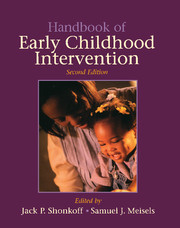Book contents
- Frontmatter
- Contents
- Foreword
- Preface
- Contributors
- PART ONE INTRODUCTION
- PART TWO CONCEPTS OF DEVELOPMENTAL VULNERABILITY AND RESILIENCE
- PART THREE THEORETICAL FRAMEWORKS FOR INTERVENTION
- PART FOUR APPROACHES TO ASSESSMENT
- PART FIVE SERVICE DELIVERY MODELS AND SYSTEMS
- PART SIX MEASURING THE IMPACT OF SERVICE DELIVERY
- 22 An Expanded View of Program Evaluation in Early Childhood Intervention
- 23 Another Decade of Intervention for Children Who Are Low Income or Disabled: What Do We Know Now?
- 24 Early Childhood Intervention Programs: What About the Family?
- 25 Economics of Early Childhood Intervention
- PART SEVEN NEW DIRECTIONS FOR THE TWENTY-FIRST CENTURY
- Name Index
- Subject Index
24 - Early Childhood Intervention Programs: What About the Family?
Published online by Cambridge University Press: 05 November 2011
- Frontmatter
- Contents
- Foreword
- Preface
- Contributors
- PART ONE INTRODUCTION
- PART TWO CONCEPTS OF DEVELOPMENTAL VULNERABILITY AND RESILIENCE
- PART THREE THEORETICAL FRAMEWORKS FOR INTERVENTION
- PART FOUR APPROACHES TO ASSESSMENT
- PART FIVE SERVICE DELIVERY MODELS AND SYSTEMS
- PART SIX MEASURING THE IMPACT OF SERVICE DELIVERY
- 22 An Expanded View of Program Evaluation in Early Childhood Intervention
- 23 Another Decade of Intervention for Children Who Are Low Income or Disabled: What Do We Know Now?
- 24 Early Childhood Intervention Programs: What About the Family?
- 25 Economics of Early Childhood Intervention
- PART SEVEN NEW DIRECTIONS FOR THE TWENTY-FIRST CENTURY
- Name Index
- Subject Index
Summary
Early childhood development (defined as occurring from birth, or before birth, through ages 6 to 7) is increasingly being viewed as the foundation of adolescent and young adult cognitive and emotional functioning. In the first half of the 1990s, evidence of the interest in enhancing early development included the Carnegie Corporation's pair of reports, Starting Points (1994) and Years of Promise (1996), the creation in 1990 of a National Goals Panel and the Goals 2000 legislation of 1994 (centering on the goal that “by the year 2000 all children will start school ready to learn”), and President Clinton's Early Childhood Initiative. A theme common to each of these endeavors is the importance of early experiences – especially supportive relationships and intellectual stimulation – for later development (Brooks-Gunn, 1997).
By the fall of 1997, excitement surrounding the early childhood years was palpable. The President and First Lady had just completed two White House Conferences on early childhood, the first on early development, with a focus on brain growth and the importance of stimulation and relationships, and the second on child care, with a focus on the need for quality care. An entire issue of Newsweek was devoted to the early years. Scholars who usually toiled in relative anonymity were showing up on television talk shows, becoming, if only for a moment, famed “talking heads.” A documentary on early development by actor and director Rob Reiner was aired on prime-time television.
- Type
- Chapter
- Information
- Handbook of Early Childhood Intervention , pp. 549 - 588Publisher: Cambridge University PressPrint publication year: 2000
- 102
- Cited by



